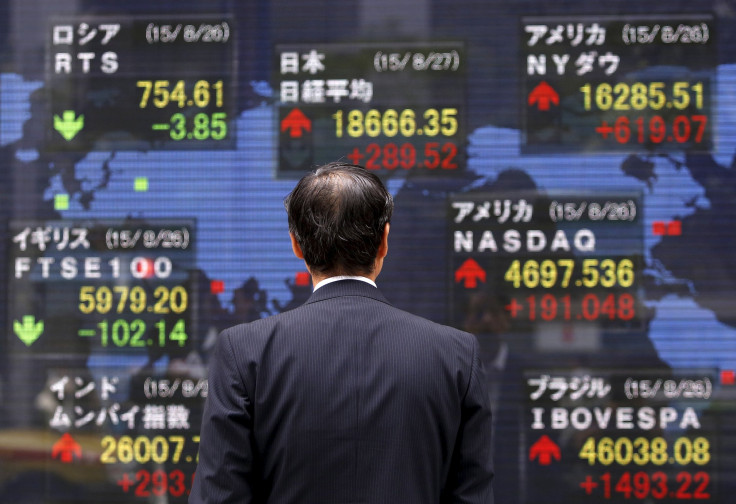Asia Markets: Shares Stage Patchy Recovery But Volatility Remains High

TOKYO (Reuters) - Asian shares struggled to recover on Thursday with volatility remaining high, while emerging economy and commodity-linked currencies softened as investors worried about the global repercussions of slower growth in China.
Japan's Nikkei <.N225> rose for the first time in four days, gaining 1.4 percent, while South Korea's Kospi <.KS11> edge up 0.4 percent, although MSCI's broadest index of Asia-Pacific shares outside Japan erased early gains.
The rally came as Wall Street stocks jumped almost 2 percent on Wednesday, which traders saw as a natural move after big falls. Despite Wednesday's rebound, shares have only recovered about half of the losses seen earlier in the week.
Also helping to boost the market, Apple
Traders were spared for now from keeping a nail-biting watch on wild Chinese share markets, which are closed for a holiday for the rest of the week.
Still, highlighting the woes that commodity exporters are suffering from concern about cooling growth in China, the Australian dollar fell 0.3 percent after weak local retail sales.
The Aussie slipped to $0.7020
Oil prices also remained volatile after their 25 percent surge late last month.
Brent crude
HIGH VOLATILITY THE NEW NORM?
While global share prices may be getting some respite, any relief rallies may be brief.
With uncertainty over policy in the U.S. and China, investors expect trade to remain extremely choppy. The CBOE Volatility index <.VIX> is still at 26 percent, about twice as high as its usual levels around 12 to 16 percent.
A similar gauge for the Japanese share market, the Nikkei volatility index <.JNIV>, stood at 35 percent.
"The fact that the volatility index is staying at a such high level points to unstable markets down the road. We may need clearer signs of stabilization in China," said Takeru Ogihara, chief strategist at Mizuho Trust Bank.
In the currency market, the dollar firmed slightly against the yen, in line with recovery in global share prices, to 120.65 yen. The euro was little changed at $1.1220
On the other hand, many emerging market currencies remained under pressure, hit byChina fears and the prospect of higher U.S. interest rates.
The Brazilian real
Emerging market currencies could face more pressure if Friday's U.S. payrolls data reinforce expectations that the U.S. Federal Reserve is on course to raise interest rates in coming months.
On Wednesday, U.S payroll processor ADP reported that private payrolls increased 190,000 last month. While that was below economists' expectations for a gain of 201,000 jobs, it was a step up from the 177,000 positions created in July.
(Reporting by Hideyuki Sano; Editing by Eric Meijer & Kim Coghill)
© Copyright IBTimes 2024. All rights reserved.





















